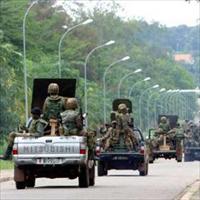COTE D'IVOIRE: Army rejects UN accusations of arms embargo violations

“We are engaged in the peace process which is under
way,” a senior military official, on condition of anonymity because he was
speaking without authorisation told IRIN on 14 April. “Permitting our men to
receive military training would be like preparing for war, something which
would be absolutely wrong.”
An arms embargo was imposed on Cote d’Ivoire by the UN
Security Council in 2004 shortly after a brief but deadly civil war which left
the country divided between a rebel held north and a government controlled
south with hundreds of thousands of people displaced.
In 2007, the war formally ended when the rebels and
government signed a peace accord in Ouagadougou
that laid out steps for the cantonment of troops, the return of displaced people
and voter identification culminating in elections. Under the terms of the
accord, full disarmament would only take place after the elections.
Although both sides have participated in arms
decommissioning ceremonies, arms inspectors from the UN Mission in Cote d’Ivoire
(ONUCI) said they have been barred from visiting some bases controlled by the
Forces Nouvelles rebels and a branch of the national army loyal to President
Laurent Gbagbo known as the Republican Guard.
In a report published on 7 April, the UN’s Group of
Experts which report to the UN Security Council stated that the refusal of the
Republican Guard to allow their facilities to be inspected had “seriously
compromised” surveillance.
It also said that both the Defence Forces of Cote d’Ivoire (FDS-CI), which is also loyal to
President Gbagbo, and the former rebel Forces Nouvelles had separately engaged
in “training with military characteristics… outside of Cote d’Ivoire”
and both sides were in violation of the embargo.
The UN Group said a major problem with the embargo was
that Ivorian customs officials have allowed prohibited weapons and other
materials to enter and leave the country.
Both sides use diamond mining to fund weapons purchases,
the report of the Group stated. It recommended that representatives of the
Kimberley Process, a system set up in 2003 to prevent rebel groups from
profiting from diamond sales, be sent to the region to try to improve controls.
The army’s rebuttal to the various accusations in the UN
report came on the same day that the Ivorian government changed the terms of
the Ouagadougou
peace accord by announcing that elections would be held on 30 November 2008,
rather than in June as stipulated in the accord, however the move was
“welcomed” by ONUCI.
On 10 April, ONUCI also commended the Ivorian government
for having made progress on voter identification. Almost half a million
Ivorians have received new birth certificates after 7,400 public hearings in 11
provinces, ONUCI said in a statement.
The right to citizenship and its denial has been
identified as one of the root causes of conflict in Cote d’Ivoire.
UN Secretary-General Ban Ki-moon will visit Cote d’Ivoire
during a mission to the region which starts on 20 April, the UN News Service
reported on 11 April. Ban will also meet with the Burkina Faso President Blaise
Compaore who mediated the Ouagadougou
peace accord.
 Back and Next - Back and Next
Back and Next - Back and Next See Also - See Also
See Also - See Also